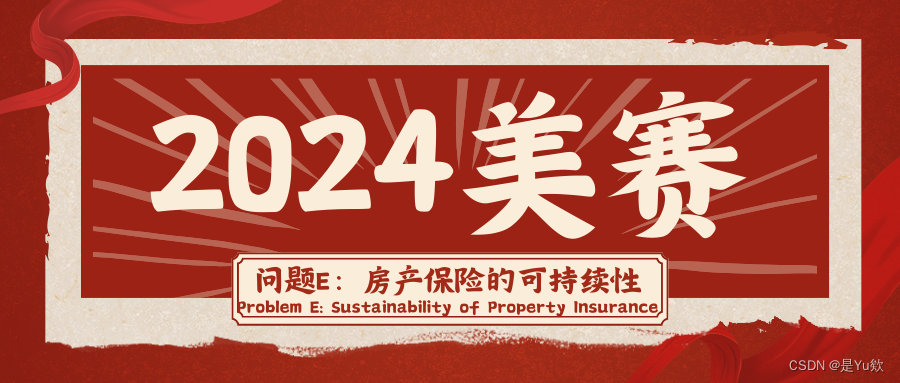- 1基于IP地址的企业网络资产暴露面普查解决方案_一个真实ip怎么去确定是哪个单位的资产
- 2Java怎么实现几十万条数据插入(30万条数据插入MySQL仅需13秒)_java大量数据快速入库
- 3基于Selenium+Python的自动化测试
- 4python自动化工具之pywinauto_pywinauto自动化操作记事本
- 5Scrapy和Selenium整合(一文搞定)_scrapy selenium
- 6Docker与Docker-Compose详解_docker docker-compose
- 7Java高并发解决方案_java高并发三种解决方法
- 8Windows安装使用docker与docker-compose_windows docker compose
- 9C语言面向对象
- 10C语言实现AES加解密算法_c 使用aes
【2024美赛】E题(中英文):房产保险的可持续性Problem E: Sustainability of Property Insurance_2024美赛e题翻译
赞
踩
【2024美赛】E题(中英文):房产保险的可持续性Problem E: Sustainability of Property Insurance
- 写在最前面
- 2024美赛翻译 —— 跳转链接
- 中文赛题
- 问题E:房产保险的可持续性
- 参考文献
- 词汇表
- 问题E:房产保险的可持续性
- 英文赛题
- Problem E: Sustainability of Property Insurance
- References
- Glossary
写在最前面
注:中文初稿由ChatGPT-4自动翻译,Yu进行了细节上的完善和调整,欢迎留言补充。本文仅供学习和交流使用,祝大家取得超乎预期的好成绩!

2024美赛翻译 —— 跳转链接
【2024美赛】在COMAP比赛中使用大型语言模型和生成式AI工具的政策Use of Large Language ModelGenerative AI Tools in COMAP Contests
【2024美赛】A题(中英文):资源可用性与性别比例Problem A: Resource Availability and Sex Ratios
【2024美赛】B题(中英文):搜寻潜水器Problem B: Searching for Submersibles
【2024美赛】C题(中英文):网球中的势头Problem C: Momentum in Tennis
【2024美赛】D题(中英文):五大湖水资源问题Problem Problem D: Great Lakes Water Problem
【2024美赛】E题(中英文):房产保险的可持续性Problem E: Sustainability of Property Insurance
【2024美赛】F题(中英文):减少非法野生动物贸易Problem F: Reducing Illegal Wildlife Trade
中文赛题

Photo Credit: Pixabay.com
问题E:房产保险的可持续性
极端天气事件正在成为房产所有者和保险公司的一场危机。世界近年来承受了“超过1000次极端天气事件造成的超过1万亿美元的损害。”[1] 保险行业在2022年因自然灾害的索赔量相比于30年平均值增加了“115%”。[1] 预计情况会变得更糟,因为由于洪水、飓风、气旋、干旱和野火导致的严重天气相关事件的损失可能会增加。随着气候变化推动,保险覆盖的保费正在迅速上涨,预计到2040年将增加30-60%。[1]
房产保险不仅变得更加昂贵,而且也更难找到,因为保险公司改变了他们愿意承保政策的方式和地点。推动房产保险费用上涨的天气相关事件在世界不同地区看起来不同。此外,保险保护缺口全球平均为57%,且在增加。[2] 这突显了行业的困境——对于保险公司而言是盈利能力的新兴危机,对于房产所有者而言是可负担性的危机。
COMAP的灾害保险模型师(ICM)对房产保险行业的可持续性感兴趣。随着气候变化增加了更严重的天气和自然灾害的可能性,ICM希望确定如何在当前位置上最好地处理房产保险,以便系统在承担未来索赔成本的同时也确保保险公司的长期健康。如果保险公司在太多情况下不愿意承保政策,它们将因客户太少而倒闭。相反,如果他们承保的政策风险太高,他们可能要支付太多索赔。在什么条件下保险公司应该承保政策?他们什么时候应该选择承担风险?房产所有者能做些什么来影响这一决定?开发一个模型,供保险公司决定是否应在发生越来越多极端天气事件的地区承保政策。使用两个发生极端天气事件的不同大陆的地区来演示你的模型。
当我们展望未来时,社区和房地产开发商需要问自己如何以及在哪里建造和发展。随着保险格局的变化,未来的房地产决策必须做出以确保房产更具有弹性并且有意识地建造,包括为不断增长的社区和人口提供适当服务的可行性。你的保险模型如何适应评估在某些地点是否建造以及如何建造?
可能有些社区,你的保险模型建议不承保当前或未来的房产保险政策。这可能导致社区领导面临有关具有文化或社区重要性的房产的艰难决策。例如,北卡罗来纳州外滩的开普哈特拉斯灯塔被移动,以保护这座历史悠久的灯塔以及
以其为中心的当地旅游业。[3] 作为一名社区领导,你如何识别社区中应该因其文化、历史、经济或社区重要性而被保存和保护的建筑?开发一个供社区领导使用的保存模型,以确定他们应采取何种措施来保护社区中的建筑。
选择一个历史地标——不是开普哈特拉斯灯塔——它位于经历极端天气事件的地点。应用你的保险和保护模型来评估这个地标的价值。撰写一页给社区的信件,推荐一个计划、时间表和成本提案,以考虑你从保险和保护模型的结果中获得的洞察,为他们珍视的地标的未来做计划。
你的PDF解决方案总共不超过25页,应包括:
- 一页摘要页,清晰描述你解决问题的方法和你的分析在问题上下文中最重要的结论。
- 目录。
- 你的完整解决方案。
- 一页社区信件。
- 参考文献列表。
- AI使用报告(如果使用)
注意:对于完整的MCM提交,没有特定的最低页数要求。你可以使用最多25页的总页数来进行所有解决方案工作和任何你想包括的额外信息(例如:图纸、图表、计算、表格)。接受部分解决方案。我们允许谨慎使用AI,如ChatGPT,尽管创建解决方案不必要。如果你选择使用生成式AI,你必须遵循COMAP的AI使用政策。这将导致你必须在PDF解决方案文件末尾添加额外的AI使用报告,且不计入解决方案的25页总页数限制内。
参考文献
[1] 波士顿咨询集团。 (2023年12月4日)。气候适应的保险风险框架。检索自:https://www.bcg.com/publications/2023/an-insurance-risk-framework-for-climate-adaptation
[2] 慕尼黑再保险公司。 (2022年1月10日)。飓风、寒潮、龙卷风:2021年美国天气灾害主导自然灾害损失。检索自:https://www.munichre.com/en/company/media-relations/media-information-and-corporate-news/media-information/2022/natural-disaster-losses-2021.html
[3] 关心科学家联盟。 (2016年7月19日)。保护一个图标:将开普哈特拉斯灯塔远离变化的海岸线。检索自:https://www.ucsusa.org/resources/moving-cape-hatteras-lighthouse-away-shifting-shoreline
词汇表
保险保护缺口:自然灾害引起的经济损失与这些损失被覆盖的金额之间的差异。
承保:接受责任,从而在发生损失或损害时保证支付。
问题E:房产保险的可持续性
英文赛题
Problem E: Sustainability of Property Insurance
Extreme-weather events are becoming a crisis for property owners and insurers. The world has endured “more than $1 trillion in damages from more than 1,000 extreme-weather events in recent years.”[1] The insurance industry saw claims for natural disasters in 2022 increase by “115% compared to the 30-year average.”[1] Conditions are expected to get worse as losses from severe weather-related events are likely to increase due to floods, hurricanes, cyclones, droughts, and wildfires. Premiums for insurance coverage are rising quickly, with climate change fueling projected increases of 30-60% by 2040.[1]
Property insurance is not only getting more expensive, but also harder to find, as insurance companies change how and where they are willing to underwrite policies. The weather-related occurrences propelling the cost of property insurance premiums look different depending on where you are in the world. Additionally, the insurance protection gap averages 57% worldwide and is increasing.[2] This highlights the industry’s dilemma - the emerging crisis in profitability for the insurers and in affordability for the property owners.
COMAP’s Insurance of Catastrophes Modelers (ICM) are interested in the sustainability of the property insurance industry. As climate change increases the likelihood of more severe weather and natural disasters, ICM wants to determine how best to posture property insurance now such that there is resilience in the system to cover the cost of future claims while also ensuring long-term health of insurance companies. If insurance companies are unwilling to underwrite policies in too many cases, they will go out of business due to too few customers. Conversely, if they underwrite policies that are too risky, they may pay too many claims. Under what conditions should insurance companies underwrite policies? When should they choose to take the risk? Is there anything a property owner could do to influence this decision? Develop a model for insurance companies to determine if they should underwrite policies in an area that has a rising number of extreme weather events. Demonstrate your model using two areas on different continents that experience extreme weather events.
As we look to the future, communities and property developers need to be asking themselves how and where to build and grow. As the insurance landscape changes, future real-estate decisions must be made to ensure properties are more resilient and built deliberately, including the viability to offer appropriate services to growing communities and populations. How can your insurance model be adapted to assess where, how, and whether to build on certain sites?
There may be communities where your insurance model recommends against underwriting current or future property insurance policies. This may result in community leaders facing tough decisions about properties with cultural or community significance. For example, the Cape Hatteras Lighthouse was moved on the Outer Banks of North Carolina to protect this historic light house along with the local tourism industry centered around it.[3] As a community leader, how could you identify buildings in a community that should be preserved and protected due to their cultural, historical, economic, or community significance? Develop a preservation model for community leaders to use to determine the extent of measures they should take to preserve buildings in their community.
Select a historic landmark – not Cape Hatteras Lighthouse – that is in a location that experiences extreme weather events. Apply your insurance and your preservation models to assess the value of this landmark. Compose a one-page letter to the community recommending a plan, timeline, and cost proposal for the future of their treasured landmark considering the insight you have gained from the results of your insurance and preservation models.
Your PDF solution of no more than 25 total pages should include:
- One-page summary sheet that clearly describes your approach to the problem and your most important conclusions from your analysis in the context of the problem.
- Table of Contents.
- Your complete solution.
- One-page community letter.
- References list.
- AI Use Report (if used)
Note: There is no specific required minimum page length for a complete MCM submission. You may use up to 25 total pages for all your solution work and any additional information you want to include (for example: drawings, diagrams, calculations, tables). Partial solutions are accepted. We permit the careful use of AI such as ChatGPT, although it is not necessary to create a solution to this problem. If you choose to utilize a generative AI, you must follow the COMAP AI use policy. This will result in an additional AI use report that you must add to the end of your PDF solution file and does not count toward the 25 total page limit for your solution.
References
[1] Boston Consulting Group. (2023, December 4). An Insurance Risk Framework for Climate Adaptation. Retrieved at: https://www.bcg.com/publications/2023/an-insurance-risk-framework-for-climate-adaptation
[2] Munich RE. (2022, January 10). Hurricanes, cold waves, tornadoes: Weather disasters in USA dominate natural disaster losses in 2021"). Retrieved at: https://www.munichre.com/en/company/media-relations/media-information-and-corporate-news/media-information/2022/natural-disaster-losses-2021.html
[3] Union of Concerned Scientists. (2016, July 19). Saving an Icon: Moving the Cape Hatteras Lighthouse Away from the Shifting Shoreline. Retrieved at: https://www.ucsusa.org/resources/moving-cape-hatteras-lighthouse-away-shifting-shoreline
Glossary
Insurance Protection Gap: the difference in protection coverage between economic losses brought about by natural disasters and the amount of those losses that are covered.
Underwrite: accept liability for, thereby guaranteeing payment in the case of loss or damage.

Copyright © 2003-2013 www.wpsshop.cn 版权所有,并保留所有权利。


